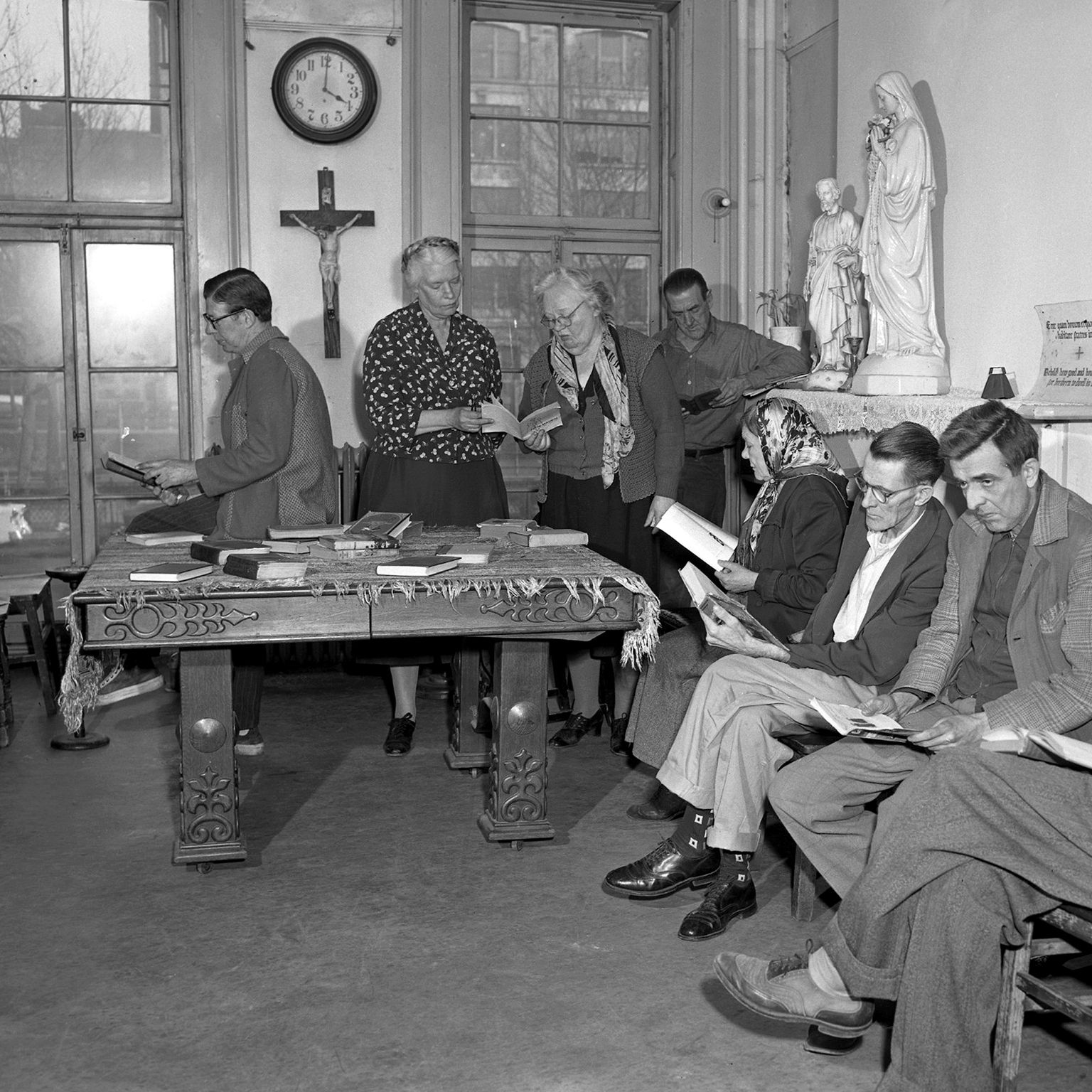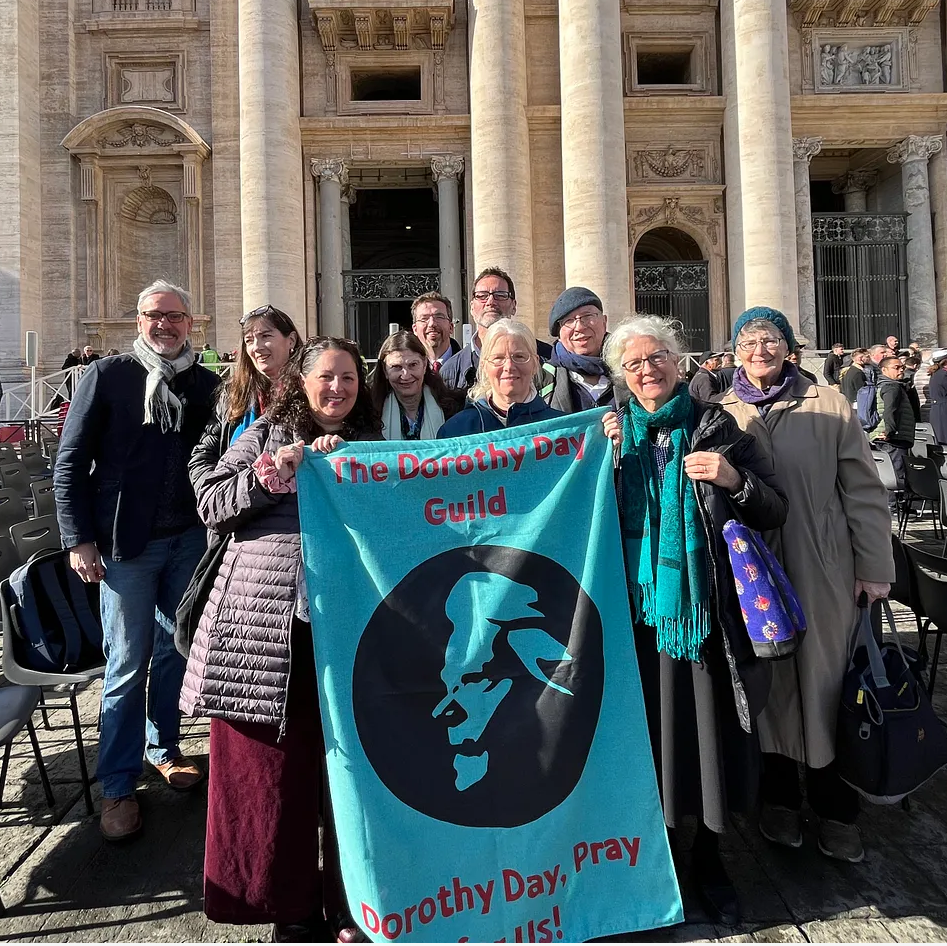GOOD TALK, With Marie Dennis
(We thank Marie Dennis for her generously granting In Our Time this interview. Marie is co-president of Pax Christi International. A mother of six who lives in a Franciscan community in the inner city of Washington, D.C., she is the author of several books, including Diversity of Vocations (Orbis Books, 2008.) This article first appeared in the Fall 2016 issue of the Guild’s newsletter, In Our Time .
In Our Time : You’ve described the Christian vocation as an “invitation to follow Jesus”–an invitation that demands an uncompromising break with “business as usual.” Certainly that was Dorothy’s experience…
Dorothy’s response to the vocation/call she so clearly discerned is an extraordinary example of an “uncompromising break with business as usual.” I think it is especially inspiring because she was already so fully engaged in life as a young woman of her “times” and a journalist who cared deeply about the rights of women, impoverished people, and others marginalized by U.S. society in the early 20 th century. Her call to a deeper commitment was enriched by faith and grounded in love of God.
Dorothy longed for a path in life that was equal to her passions. “I wanted life, and I wanted the abundant life. I wanted it for others too…. And I did not have the slightest idea how to find it.” Can you talk a little about some of the “clues” she found that helped her on her way?
I think Dorothy was deeply touched by the reality she encountered in the streets of New York. The poverty she witnessed in the midst of the Depression was one clue. Another I believe was in her own active mind and spirit. She obviously reflected deeply on the life of her daughter, Tamar, and was moved to change her life in response. A third forceful clue was in her encounter and friendship with Peter Maurin, who engaged Dorothy intellectually in powerful ways.
Dorothy famously and tearfully prayed, following her reporting from the sidelines on the 1932 Communist-led Hunger March in Washington, D.C., that some way would open up for her to use what talents she possessed to serve the poor and unemployed. How has the role of the laity evolved in regard to working for social justice?
In many ways Dorothy was an inspiration and an anchor for a movement of Catholics, including many lay people, who responded to critical social issues of a given era. She was not alone in caring about the poor and unemployed–although it does seem that work was then primarily the vocation of many men and women religious. However, the rich social teaching documents of the Church before ( Rerum Novarum , Quadragesimo Anno , Mater et Magistra , and Pacem in Terris ), during (especially Gaudium et Spes ) and after ( Call to Action , Justice in the World ] the Second Vatican Council brought lay people to the heart of the Church’s work for social justice.
We tend to think of Dorothy’s “vocation” as being the Catholic Worker movement. But that involved many different kinds of activities: from writing to protesting to speaking to ladling out soup. And she was always a mother and later a grandmother. Is this what you mean by having a “diversity” of vocations?
Yes, absolutely. That is the experience of so many of us. The diversity of Dorothy’s vocations was particularly inspiring to me. As one who has lived in an intentional community (Assisi Community) for the past 30 years, including with four of my children, I was deeply moved by Dorothy’s struggles as a mother living in the Catholic Worker community. At the same time, her radical appropriation of the Gospel message, especially her commitment to the poor and homeless, as the norm for life as a lay person was deeply challenging and inspiring.
Dorothy characterized several periods of her life as times of “wandering,” notably a five year stretch following her conversion where, though she participated in the sacraments, she had no Catholic friends. Later at the Catholic Worker, the importance of community was repeatedly stressed. What role in Dorothy’s life, and in general, do you attribute to community?
I believe that community became central to Dorothy’s life once she started the Catholic Worker. Community kept her grounded at the margins of society and often helped her discern the way forward. In the book I wrote with others, St. Francis and the Foolishness of God (Orbis, revised 2015), we wrote about the evolution of community in the life of the Church to which Dorothy and the Catholic Worker made a huge contribution.
Dorothy never saw the Catholic Worker “vocation” as being for everyone. But she did see certain practices, regardless of the particular form one’s vocation took, as being fundamental to any Christian life, right?
I assume that Dorothy would see a connection to marginalized people, simplicity of lifestyle, and connection to community in some form to be essential to the Christian life. All of these speak to being “poor in spirit.” Diversity of Vocations has a section that reflects on this from my perspective:
To be poor in spirit we have to live in a manner that is conscious of the reality in which most people live; understand the systemic and structural connections between our prosperity and others’ poverty.
To be poor in spirit we have to shape our lives and futures from the standpoint and for the sake of those who are poor.
But, how does this vocation–to be poor in spirit–this privileged place of poor people–intersect with other calls we have heard, the call to parenting, for example, or the call to a single life, or the call to teaching, to mission, to medicine? Is this call of Jesus, this foundational theme in the beatitudes, reserved for a chosen few?
That only a few should care about the poor clearly was not the message of the Sermon on the Mount, but to live in solidarity with those who are poor, to be poor in spirit with all that vocation implies remains a tremendous challenge for followers of Jesus who, like the rich young man in the gospel have “many possessions” or already busy lives. (Mark 10:23 NRSV)
…Every parent, I suspect, tries to instill in one’s child an awareness that all the children in the world don’t have hundreds of choices in breakfast cereal or the latest computer or even a house to live in. I believe deeply that teaching children to live simply–modeling for them how to live with less on a daily basis in a consumer society–is one of the greatest gifts we can give them.
Choosing to live in neighborhoods and towns that are economically diverse; where people with vastly different means live side by side; where their children go to school together and play together; where employers and employees know each other as human beings; and where people commit themselves to the common good is another.
To work toward a society where such an integrated way of life is even possible may be a vocation in itself.
I think Dorothy would agree.
Dorothy liked to say, “You will know your vocation by the joy that it brings you.” Can you reflect more on this?
Again, in Diversity of Vocations the whole last chapter talks about joy:
God calls us to a fundamental orientation, an option for discipleship, that sets the stage on which we dance the dance of life and promises happiness (Blessed are you …) to those who heed the call …
Increasingly, I am convinced that as adults and honest followers of Christ, we know in our souls when we are living faithfully the vocation or vocations to which we have been called. We know Jesus’ story very well. We know what and how he called all of us to be and we know when we have followed and when we have turned away in sadness like the rich young man.
If we look very carefully at the reality of the world into which we are sent–with all its hopes and fears, joys and sorrows … hopes and fears, joys and sorrows that, if we are open to them, soon become our own–then we will begin to hear the Good News. If we have the courage to ask why the brokenness we see is so pervasive, why the beauty is so rarely seen, then we will begin to hear the Good News. If we have readied ourselves to be changed, converted, to find God as we are called and respond to new vocations, then we will begin to hear the Good News. It will begin to make sense to us in ways we never thought possible; we will see it lived in three dimensions and in brilliant color.…
As we accompany the pain and celebrate the beauty wherever we are planted–as we nurture just relationships and live compassionate lives–we are, we will be, helping to build the beloved global community of all life.
And we will know joy.
Anything else, Marie, you’d like to add?
Dorothy’s commitment to nonviolence. Even beyond a commitment to nonviolence, her strict pacifism was extremely challenging, especially during the Second World War.
-
Our deep thanks to Bro. Martin Erspamer, OSB, for the use of his iconic images (preceding columns for “Good Talk,” “Breaking Bread,” “Sowing Seeds,” “Signs of Holiness”)
-
Share this post





